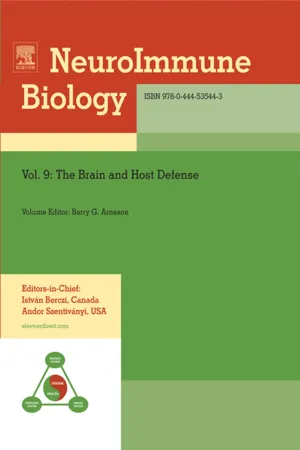
- 358 pages
- English
- ePUB (mobile friendly)
- Available on iOS & Android
The Brain and Host Defense
About this book
It is now well recognized that the brain, and especially the hypothalamus, plays an important role in the regulation of immune reactions and inflammation. This book aims to review our current state of knowledge of this important field. Key historical findings are presented, and the reciprocal interactions between the brain and the immune system are examined. Particular emphasis is placed on inflammation, a critical host defense reaction that serves as an effector response for both the adaptive and innate immune systems.Mechanisms implicated in brain defense, as well as in more general host defense, are discussed. The regulatory influences of the brain on inflammatory responses are included with particular reference to the role of the hypothalamus, which is also the main director the hormonal regulation of immune/inflammatory. Gender-related differences in immune responsiveness, circadian modulator of immune responses, and evidence that behavioral conditioning (e.g. reward) of immune responses is possible are used as examples to reinforce the notion that the neuroendocrine system exerts a fundamental and complex regulatory influence on the immune system.- Presents timely issues such as immunological aspects of the blood-brain-barrier and the role of inflammatory mediators in the evolution of strokes and degenerative diseases- Includes analysis of the role of the brain in the adaptive responses to disease- Evaluates the argument that further knowledge of the influence of the brain on the immune system will provide new insights to the pathophysiology infectious and autoimmune diseases
Frequently asked questions
- Essential is ideal for learners and professionals who enjoy exploring a wide range of subjects. Access the Essential Library with 800,000+ trusted titles and best-sellers across business, personal growth, and the humanities. Includes unlimited reading time and Standard Read Aloud voice.
- Complete: Perfect for advanced learners and researchers needing full, unrestricted access. Unlock 1.4M+ books across hundreds of subjects, including academic and specialized titles. The Complete Plan also includes advanced features like Premium Read Aloud and Research Assistant.
Please note we cannot support devices running on iOS 13 and Android 7 or earlier. Learn more about using the app.
Information
Table of contents
- Cover image
- Table of Contents
- Foreword
- Preface
- The Hypothalamus is the Central Organ of Immunoregulation
- Leech Neuroimmune Signaling
- Morphogenesis of the Hypothalamus and Hypophysis
- A Novel Genus of Specialized Anti-Inflammatory and Pro-Resolution Lipid Mediators
- Neural and Non-Neural Stem Cells as Novel Therapeutic Modalities for Brain Injury
- The Role of the Toll-Like Receptors in Neuropathology
- Cytokines and the Immune–Neuroendocrine Network
- Orexin-Containing Neurons and the Immune System
- Central Pathways of Immunoregulation
- Brain Responses to Antigenic Challenges
- Role of the Endocrine System
- Conditioning of Immune Reactions
- Gender Issues in Host Defense
- Glial Cells in Brain Defense Mechanisms
- Immunologic Privilege and the Brain
- Immune Aspects of the Blood–Brain Barrier
- Neuroprotective Activities of CD4+CD25+ Regulatory T Cells
- Fever as a Host Defense Mechanism
- Leukocytes as Mediators of Pain and Analgesia
- Tumor Necrosis Factor as a Neuroinflammatory Mediator in Alzheimer's Disease and Stroke: Molecular Mechanisms and Neuroinflammatory Imaging
- Multiple Sclerosis and Depression: A Neuroimmunological Perspective
- 1. Introduction
- 2. Frequency of Depression in MS
- 3. Depression Prior to Onset of MS
- 4. Family History of Depression in MS
- 5. Depression at Onset of MS
- 6. Depression in Elderly MS Patients
- 7. Clinical Features of Depression in MS
- 8. Symptoms Shared Between Depression and MS
- 9. Clinical Correlations
- 10. Suicide in MS
- 11. Migraine and MS
- 12. Brain Metabolism in Depression
- 13. Brain Metabolism in MS
- 14. MRI, Depression and MS
- 15. The Hypothalamic–Pituitary–Adrenal (HPA) Axis in Depression
- 16. The HPA Axis in MS
- 17. Bipolar Disease
- 18. The Immunology of Multiple Sclerosis
- 19. Cytokines in Depression and the Effect of Antidepressants on Cytokines
- 20. Brain-Derived Neurotrophic Factor (BDNF) in Depression and in MS
- 21. Corticotrophin-Releasing Hormone (CRH) in Peripheral Tissues
- 22. Does Depression Complicate Treatment of MS with Immunomodulatory Drugs?
- 23. Management of Depression in People with MS
- Acknowledgements
- Infection and Sepsis
- Restoration of Neuroimmune Disturbances in Rats by Extra-High-Frequency Electromagnetic Irradiation of the Skin